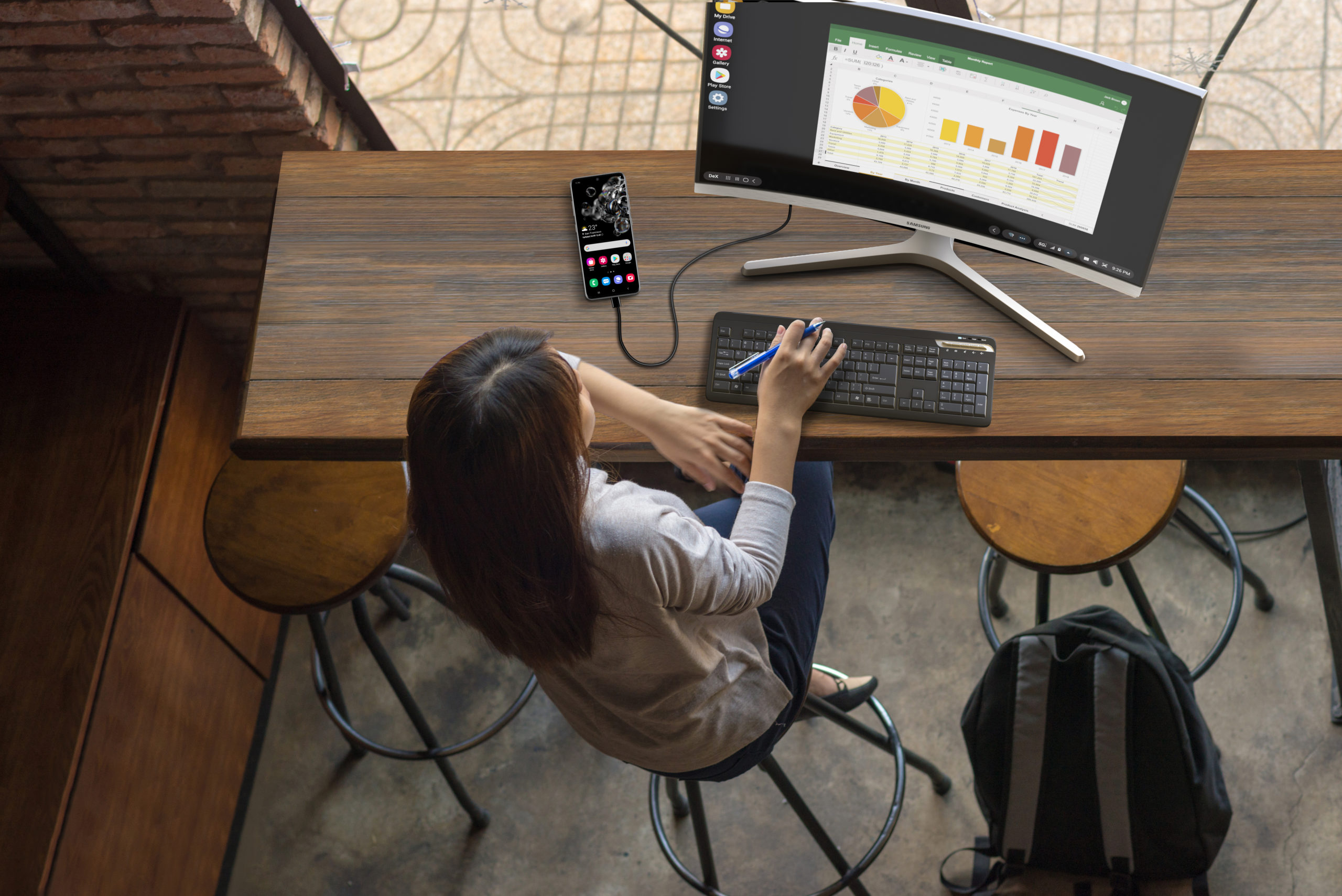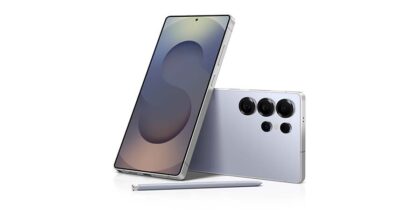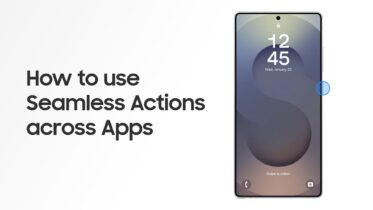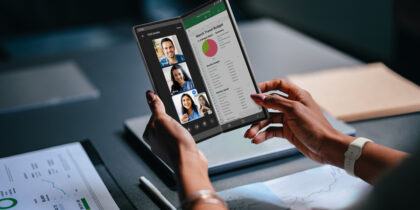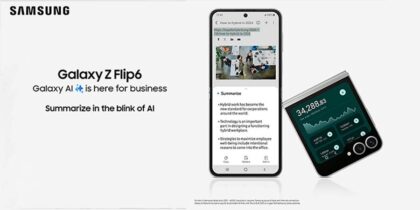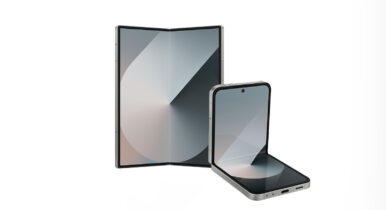We’ve all seen the evolution of mobile computing technology firsthand over the past decade, but probably don’t fully appreciate how much it has increased our productivity at work. Not so long ago, a “lucky” employee might have been issued a chunky notebook computer. Eventually, that was joined by a bulky cellphone. Over time, though, the laptops got sleeker, and the phones got smarter. The busy professional’s mobile computing arsenal converged and became simpler, lighter and more powerful — especially on the smartphone side.
Forget the oft-cited statistic that today’s smartphone is more powerful than the mainframe computer NASA used to send astronauts to the moon. Today’s smartphones are almost a thousand times faster than the mid-’80s Cray-2 Supercomputer, several multiples faster than the computer onboard NASA’s Perseverence Rover currently exploring Mars and — perhaps most significantly — faster than the laptops most of us are carrying around today.
When it comes to the power in our primary computing devices, we haven’t just reached a tipping point — we’ve already tipped.
Powering mobility
Consider Samsung’s Galaxy Z Fold3, which was just unveiled at the Aug. 11 Galaxy Unpacked event. With its 7.6-inch internal display and support for Samsung DeX, Galaxy Z Fold3 is a fitting example of how mobile devices can deliver a PC-like experience.
Galaxy Z Fold3 comes with 12GB of RAM and 256GB or 512GB of storage. To put that in perspective, the first Galaxy S smartphone released in 2010 had just 512MB of RAM and 8GB or 16GB in total storage.
Its application processor, the Qualcomm Snapdragon 888, is built using 5nm lithography and features eight cores with a maximum clock speed of 2.84GHz.
Galaxy Z Fold3 features full 5G connectivity (mmWave and Sub 6) that rivals the throughput you’ll achieve on your laptop over most Wi-Fi networks. Galaxy Z Fold3’s adaptive Dynamic AMOLED 2X display — both unfolded and folded — maximizes your productivity with smooth motion and fluid scrolling, and few laptops can compete with its all-day battery life.
Beyond that are all of the smartphone features that most laptops lack, including its three 12MP rear cameras capable of recording up to 8K video, and biometric sensors for fingerprint and facial authentication.
No more compromises
It makes sense that smartphones should now serve as our primary computing devices. The performance gap between smartphones and laptops keeps widening, as users upgrade their smartphones at a faster rate than their notebook PCs.
An estimated 6.06 billion smartphones were in use globally at the end of 2020 — three times the number of PCs. The smartphone-using population is expected to keep growing 4 percent per year and hit 7.69 billion by 2026.
Workers in every industry are increasingly relying upon smartphones. According to 2017 GfK research commissioned by Samsung, mobile workers spend, on average, one-third of their working day using their smartphone. When asked which computing device they would keep if they had to pick just one, a plurality of 42 percent opted for their smartphone over desktops, laptops, tablets and other choices.
Not all the same
Still, most smartphones are better geared towards consuming content than generating it. When it comes to creating reports or other complex work tasks, Samsung’s flagship Galaxy devices — not least the new Galaxy Z Fold3 foldable — give you the creative control and flexibility you need to stay on task throughout the day.
With its expansive screen, Galaxy Z Fold3 lets users work across up to three apps simultaneously with Multi-Active Window. Need to check numbers while reviewing an Excel spreadsheet? Just drag and drop the Calculator app alongside.
With the device in Flex mode, you can set it down on a table for hands-free video conferencing while taking notes or checking your calendar in the bottom half of the screen.
Galaxy Z Fold3 is also the first Samsung foldable that is compatible with the S Pen. With the optional S Pen Fold Edition or S Pen Pro, users can enjoy a true pen-to-paper feel while taking notes or sketching out ideas.
Seamless integration with Microsoft puts the office at your fingertips, making your work accessible across all your devices. That’s the kind of laptop-level productivity workers used to dream about getting from their smartphones.
Forget your laptop — on purpose
At Samsung, we’re driving forward the convergence of PC and phone via our Samsung DeX platform.
Built into our latest flagship phones, Samsung DeX gives busy professionals a mobile-powered desktop experience that helps them stay productive and secure wherever their work takes them. Users can turn any space into a workspace by connecting to a monitor, keyboard and mouse. DeX delivers an intuitive desktop experience that’s optimized for your productivity apps, with all the core desktop functionality like multiple resizable windows, keyboard shortcuts and drag-and-drop with your mouse.
With DeX on Galaxy Z Fold3, you even create your desktop experience wirelessly. All you need is a TV or monitor that supports Miracast, such as Samsung’s Smart Monitor. In DeX mode, you can use the processing power of your Galaxy Z Fold3 combined with a mouse and keyboard to work while checking texts, taking conference calls and seamlessly multitasking on your phone, all without the hassle of various wires and attachments. This way, you have two screens to do twice as much.
Samsung DeX offers an exciting opportunity for enterprises, particularly those with remote workforces, to leverage the power of smartphones and move to a mobile-only computing strategy.
A long-term mobile strategy
Given the power of today’s smartphones and their critical importance to workforce productivity, why do so many organizations still rely on Bring Your Own Device (BYOD) strategies? For many enterprise IT leaders, BYOD has been motivated by short-term cost savings. But in the long term, mobile is a great factor in business value, so proactive investment pays off.
Go mobile-only with Samsung DeX
Your comprehensive guide to rolling out a mobile-only solution for your workers. Download Now
Samsung’s study with Oxford Economics sought to provide hard data in the BYOD versus corporate-issued debate. The study looked at the totality of enterprise mobile investments — from device and carrier connectivity to in-house management overheads, outsourcing, mobile device management (MDM) software and employee mobile stipends. It turns out the device is just a small part of the equation. BYOD represents a savings of just 11 percent compared to providing employee devices.
When it comes to mobile’s perceived business value, the study found that BYOD companies are the least satisfied. Senior IT professionals and business leaders surveyed were less happy with how BYOD supported collaboration, communication, access to work-critical information and everyday business responsibilities.
While each organization has different needs, CIOs and other business leaders need to look long-term, viewing mobile as a core driver of productivity and revenue.
As for employees and other end users: If you’re not sure whether it’s time to upgrade your smartphone, consider how much you rely on it to get things done quickly and securely. It’s probably already replaced your desktop or laptop PC for a lot of purposes and become your primary computing device.
You owe it to yourself and your colleagues to use the best available tools for powerful on-the-go connectivity. On Samsung’s Galaxy Z Fold3, with even-more-productive DeX experience and multitasking capabilities, that’s exactly what you’ll get.
Sign up for a Samsung Business Account to get exclusive offers, including volume pricing discounts, on Galaxy Z Fold3 5G and Galaxy Z Flip3 5G today. And get the most out of Samsung DeX with our free guide to this mobile-powered desktop solution.

